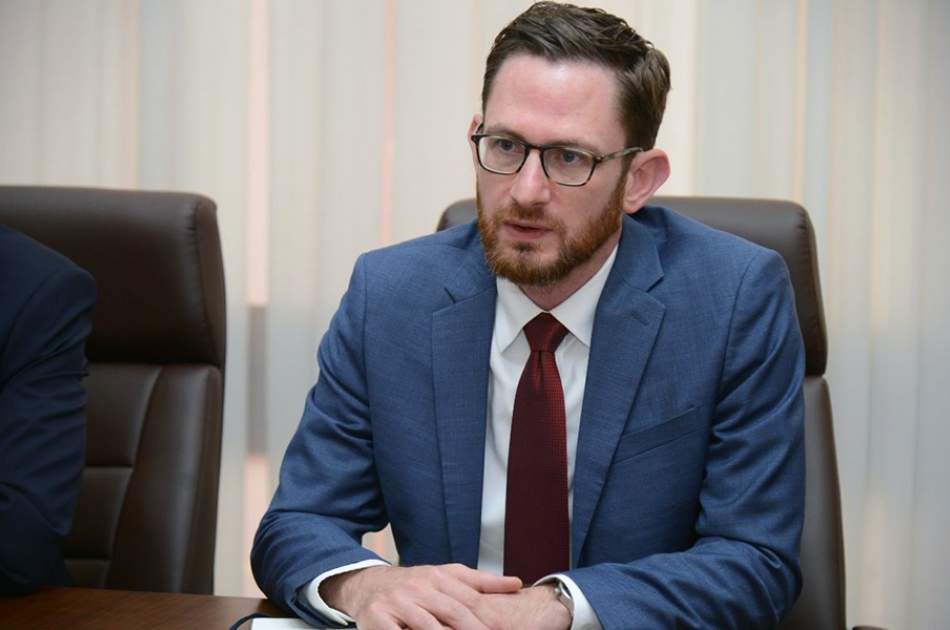US Special Envoy for Afghanistan Thomas West, in a briefing after a two-day meeting in London, said the appointment of a UN special envoy is also an “opportunity” for the Taliban, noting that the United Nations’ recent resolution reflects a “need for change in diplomatic approach.”
West, speaking online to journalists about the London meeting with special envoys from G7 countries, described the UN envoy as an “empowered person” to work in Afghanistan and liaise among key capitals.
The meeting in London, attended by several envoys, focused on “shared interests.” West emphasized the US policy aims to “advance US interests” and “support Afghans.”
“It was the feeling of the Security Council in the spring of this year that the current international approach to Afghanistan was not working. We were not supporting the Afghan people in efficient and realistic way and there needed also to be changes in our diplomatic approach to Afghanistan,” West said. “And so this independence by the special coordinator calls for three big things. Number one: The continuation of a meeting format the secretary general of the United Nations convened last May and there are discussions underway for a second meeting of this format in the coming weeks and months.”
He added: “Second, the Independent assessment called for the appointment of a coordinator or an envoy to lead a diplomatic process that envisions the full integration of Afghanistan into the international system in return for the Taliban’s fulfillment of state of Afghanistan’s obligations.”
He noted the region and the West share common objectives in Afghanistan.
“I just want to say that I think this is a big opportunity for the state of Afghanistan and also for the Taliban. We need an empowered rational voice whose interests are aligned with that of the international community as well as that of the Afghan people. We need an empowered person not only to work in Afghanistan but also to shuttle among the key capitals that all need to be consulted about what this pathway to full normalization really looks like,” he added.
Humanitarian Situation
West reported that 70% of Afghans lack basic needs, and 29 million require urgent humanitarian support. As the largest donor, the US has contributed $2 billion since August 2021. He stressed that US aid, reaching 26 million people last year, is distributed through the UN and NGOs, not the Taliban.
“As we look ahead to the character of international assistance to Afghanistan, we certainly need to find ways to make this assistance more sustainable. We want to get away from simply buying oil and flour and rice. We want to move toward assistance that can create livelihoods, that can support the private sector. And that is an ongoing conversation among major donors,” he stated.
Education
On International Day of Education, West emphasized the need for education in Afghanistan, noting that women and girls have been denied secondary education for two and a half years, with over 80% of secondary school-age Afghan girls out of school and higher education shuttered for over a year.
“Today is the International Day of Education and we need to acknowledge that women and girls have not been able to access secondary education for two and a half years now,” he said. “More than 80% of secondary school-age Afghan girls are out of school. Access to higher education has been shuttered for over a year.”
“We have to stress that educating all Afghans, this isn’t Afghan demand to this, not a foreign demand. And the country is experiencing grave economic, losses keeping women away from education and away from the economy. Certainly, a sentiment that I hear from Afghans very often is that just a country that wants to stand on its own two feet,” he said.
Moreover, the US special envoy said the United States policy also includes achieving its objectives in Afghanistan and this includes protecting and advancing US interests, and continuing to support the Afghan people.
Engaging with Afghans
“On the first front, I would say that we have a policy of engaging with all Afghans. That includes the Taliban as well,” West said.
“We are also in touch with the Taliban on a whole range of issues on the fulfillment of the security commitments they have made to the international community, regarding their commitment to continue to allow properly documented Afghans both to come into the country as well as to depart the country if they wish. We are in touch regarding the status of the economy and the banking sector in particular,” West added.
He said that recently, they also began a dialogue regarding narcotics issues. “Here, it is notable that UNODC assesses that poppy cultivation has reduced 95 percent” between 2022 and 2023, he said.
“A lot of that has to do with the Taliban’s poppy ban from 2022 which has been implemented,” West added. The US envoy said that it is in the international community’s to support Afghan farmers with alternative livelihoods.





